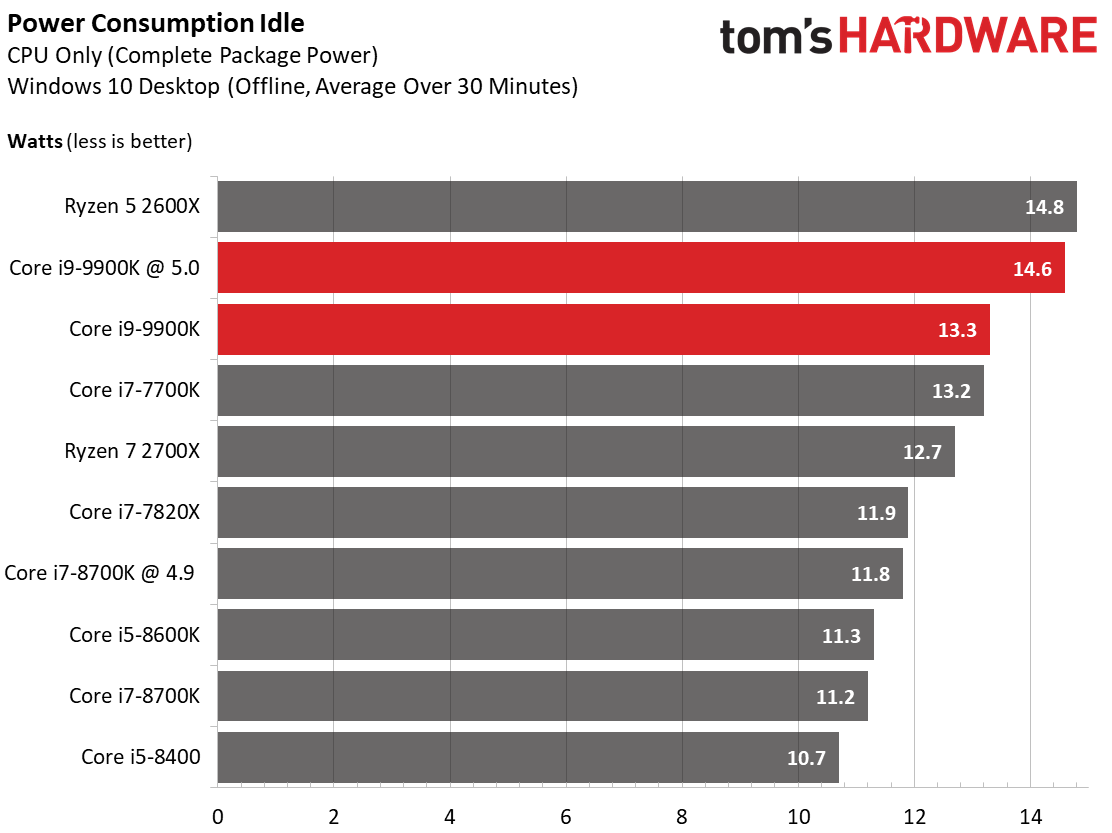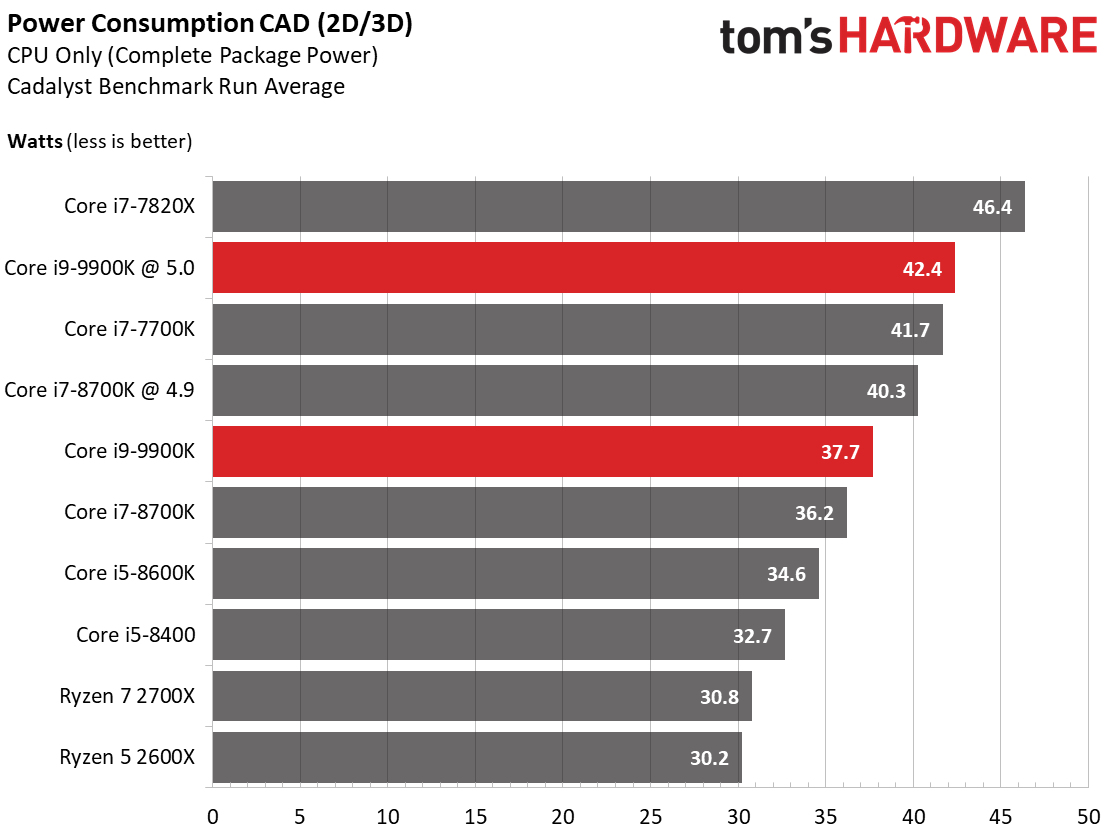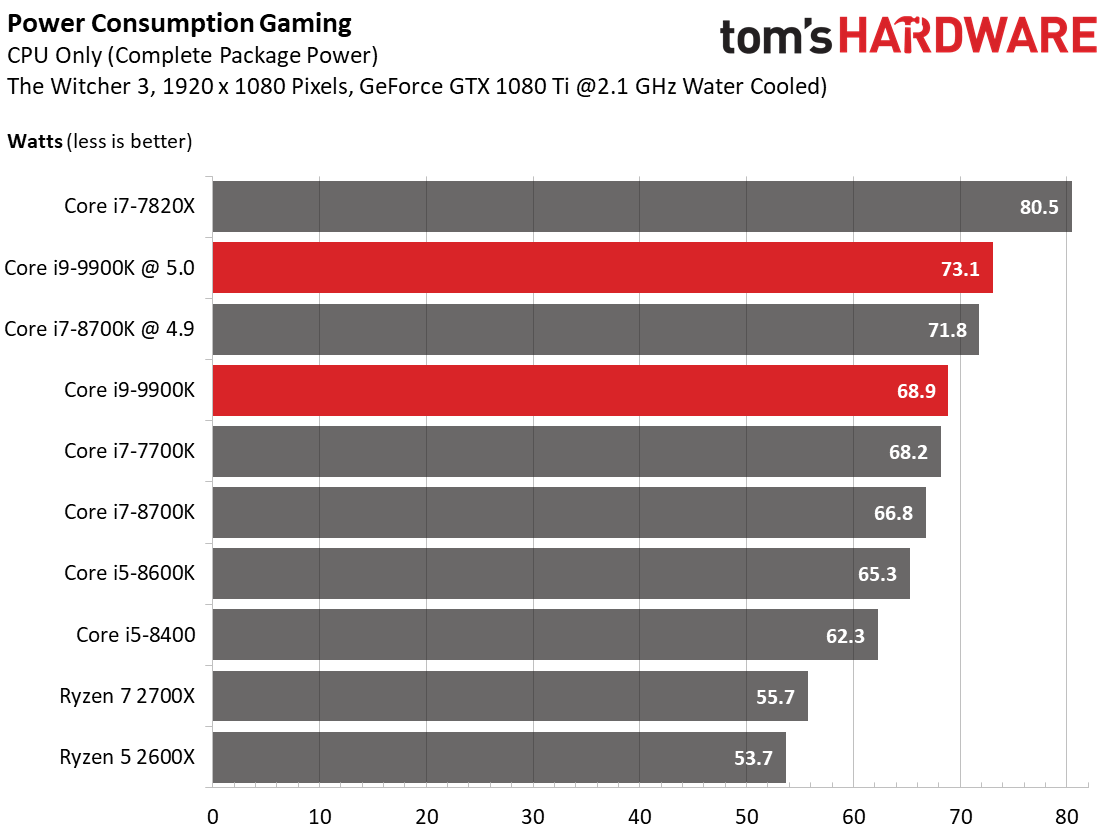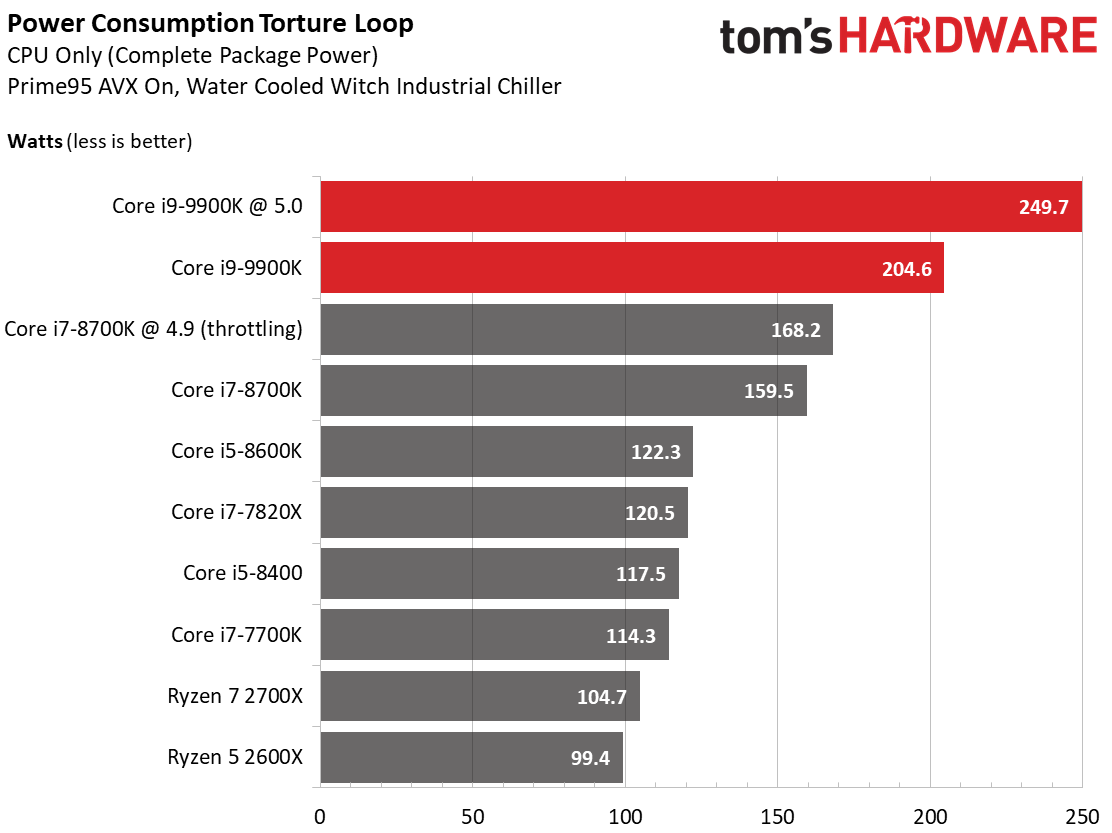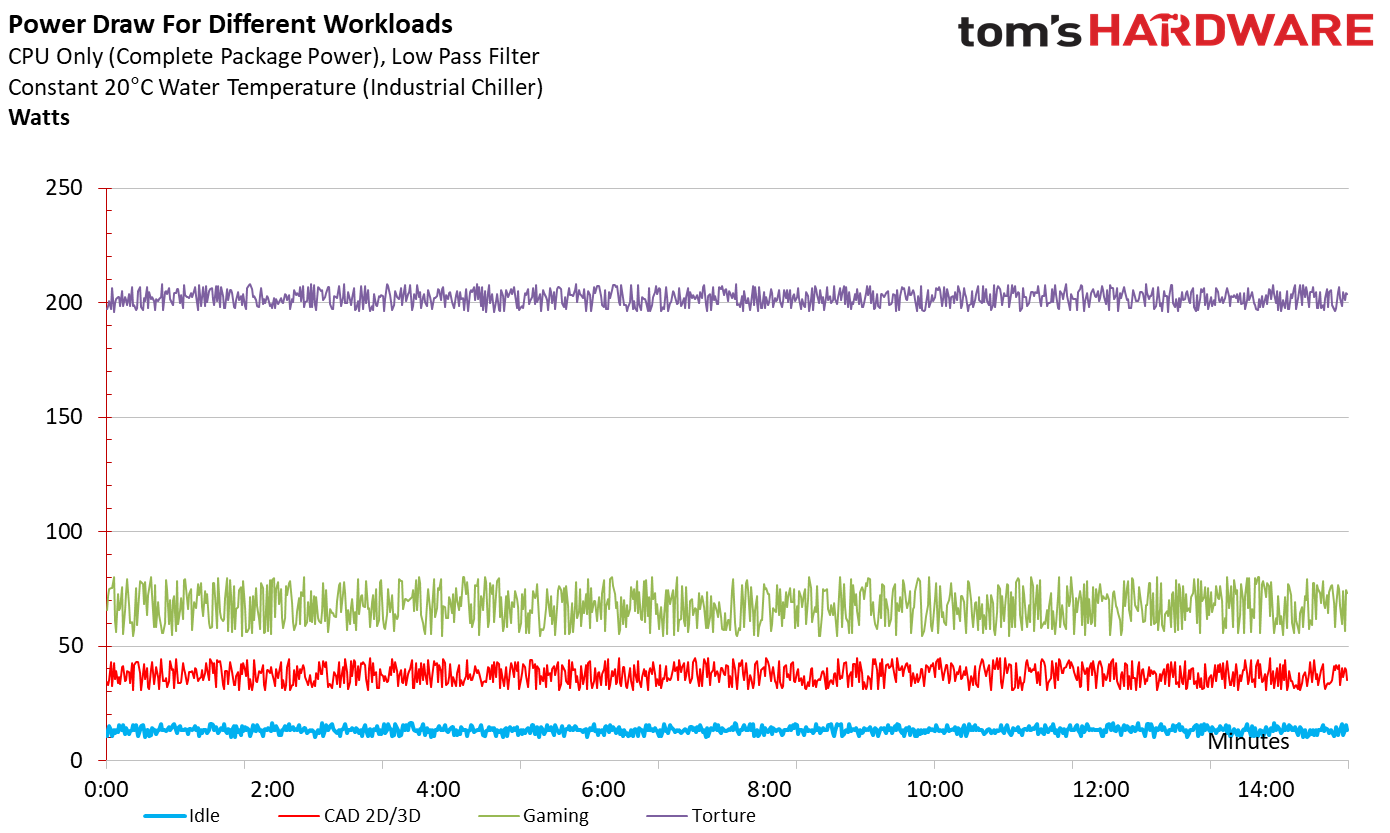Intel Core i9-9900K 9th Gen CPU Review: Fastest Gaming Processor Ever
Why you can trust Tom's Hardware
Power Consumption
Power consumption measurements are always a bit tricky, but as long as the 12V supply (EPS) readings and the sensor values of the power supply of the mainboard plus voltage transformer losses plausibly coincide, everything is fine. Therefore, we again rely on the pure package power to avoid possible influences from the motherboard. The values of the PWM controller are really very reliable if taken as averages over a period of a few minutes.
At idle, everything is perfectly fine. Both the stock and overclocked Core i9-9900K sip power. The fact that the Ryzen 5 2600X lands at the top of our chart is confirmed by our bad sample. This is definitely not a general AMD problem though, as the Ryzen 7 2700X shows. In general, however, all the CPUs are quite economical.
Both -9900K configurations are still in good shape during the CAD workload: the chip's power consumption is only slightly higher than the Core i7-8700K. So far, the very high voltage needed for stable operation does not make a disturbing impression. Everything is still in the green.
Power consumption is also within the expected values during the gaming loop, especially since the game does not fully utilize all cores. Although a comparison test with Assassin's Creed Origins did yield much higher values (up to 20W more), that game is so poorly optimized that we measure completely different values each time.
Five measurements with five strongly diverging results are not something that would be apt for a fair comparison. However, at 5 GHz, the Core i9-9900K never really crossed the 100W limit, so it was still cool enough to make ends meet. At least for games.
But power becomes more of an issue in some productivity applications because a constant load on all cores at high clock rates is almost too much. And to be clear, the Core i9-9900K gets super hot faced with Prime95 and AVX instructions (205W stock, 250W overclocked), exceeding the specified TDP.
We measured 137W (232W) during the Cinebench test, and we topped 145W (241W overclocked) under the larger Blender workload. We even pushed past 120W (198W overclocked) with various CAD plug-ins for Creo and SolidWorks. The limits of normal all-in-one compact water cooling solutions are in sight during standard operation at 4.7 GHz on all cores, but you can easily overwhelm cheaper AIOs during overclocking.
Get Tom's Hardware's best news and in-depth reviews, straight to your inbox.
Finally, and because we like the additional detail, here are the line charts corresponding to our long-term measurements.
MORE: Best CPUs
MORE: CPU Benchmark Hierarchy
MORE: All CPUs Content

Paul Alcorn is the Editor-in-Chief for Tom's Hardware US. He also writes news and reviews on CPUs, storage, and enterprise hardware.
-
dlim389 "The better the cooling, the better power consumption"? What?! This doesn't make sense at all. You meant the better the cooling, the lower the temperature.Reply -
siman0 "Redefine" at double the price of a 2700x it needs to do more than that. The price diffrence is more than enough to go up another GPU tier ie 1070ti to a 1080ti. Id rather have more pcie bandwidth and the ability to upgrade my cpu till 2020. The only way Id recommend a upgrade to something close is if you already have the motherboard. But even then Id say the 9700k.Reply -
s1mon7 Wait, so it performs within a spitting distance of the 2700x with DOUBLE the power consumption and price? Holy smokes, I thought Intel will be able to easily take on AMD after they launch their 8-cores. I have to say that these results were very surprising to me, since I believed in this being the ace up Intel's sleeve. This is really interesting, and a big win for AMD. The 9900K goes through twice the power just to squeeze out that extra clock speed edge to outperform the 2700x by a mere 10%, at double the price, mind you.Reply
Intel clearly needs 10nm and a new architecture to go back into the game. As is, I struggle to think of any reason to buy the 9900k. -
TCA_ChinChin Interesting chip from Intel, but if you are looking at CPUs from a performance per dollar point of view, its rather disappointing. The real disappointment is the 9700k which is more expensive than the 8700k but performs basically the same on average.Reply -
Adrian Ocampo As a gamer, why would I buy a 9700K when an 8700K trades blows with the 9900K in both gaming and productivity. It just doesn't make sense. Its like its just competing with its own product as this point. I would be better off buying an 8700K deliding it, put liquid metal and overclock to 5.0Ghz for a much lower price than a 9900K.Reply -
gfaiii Guys just as a heads up you should say second generation 1151 socket, these are NOT compatible with 200 series boards that have 1151 sockets (without modding)Reply -
sonichedgehog360 Ladies and gentlemen, Intel’s FX 9000 series.Reply
(By the way, I totally saw this coming what with the crazy clock speeds they were pushing.) -
Johnpombrio I was surprised on how well the i9-9900K did on stock clocks. I may not even bother with overclocking as it does well even without it and I may be able to use air cooling that way. Compared to my Kaby Lake i7-7700K, it definitely is a big step up. I already have the ASUS Strix Z380 mobo, 32GB Corsair Dominator Platinum memory kit and have preordered the CPU.Reply -
redgarl For the money, you can buy a motherboard, a CPU and a 1080 GTX for the same price as the 9900k with it's motherboard.Reply
Also, you tested this system on a 600$ motherboard... 600$ and a prenium cooling solution.
This system is above the 2000$ threshold compared to an AMD one barely hitting the 1000$.
